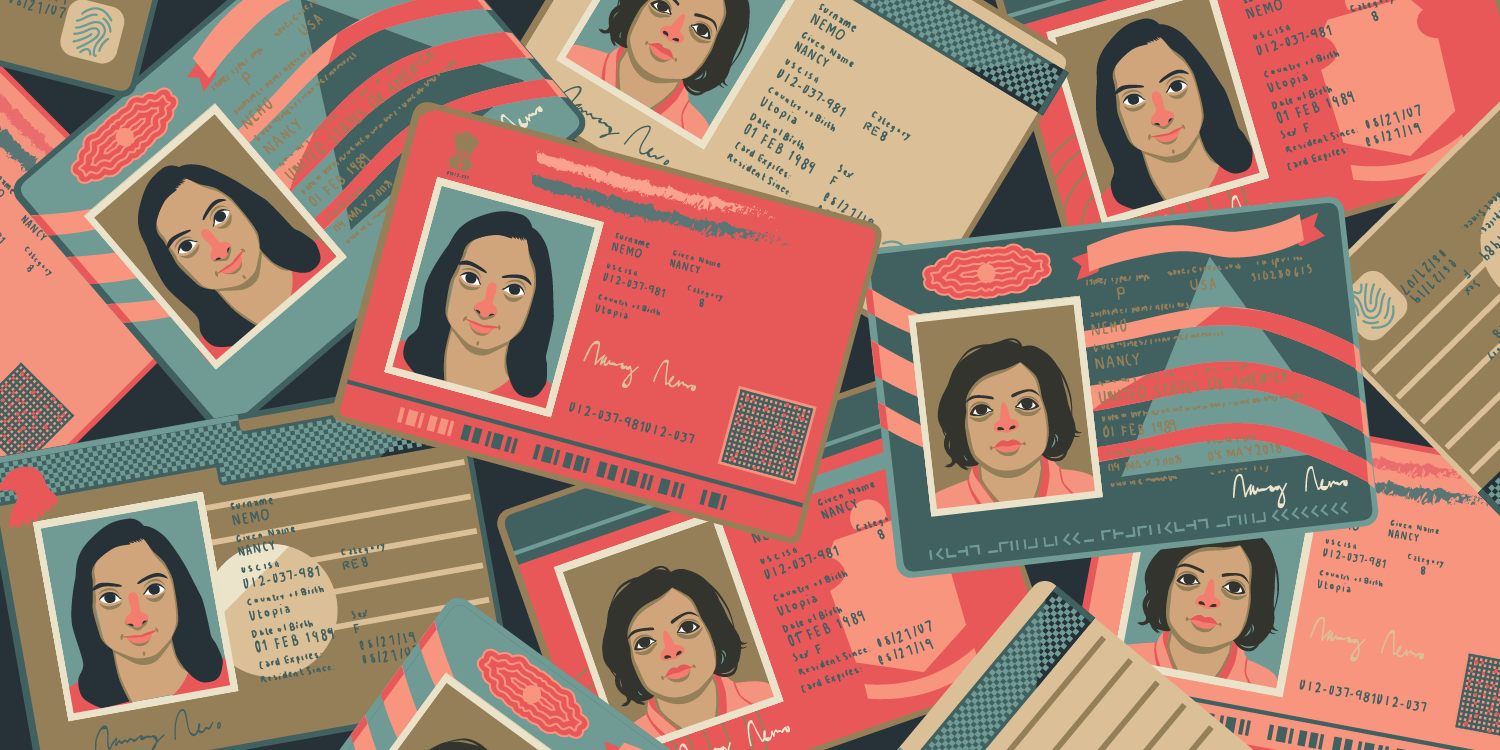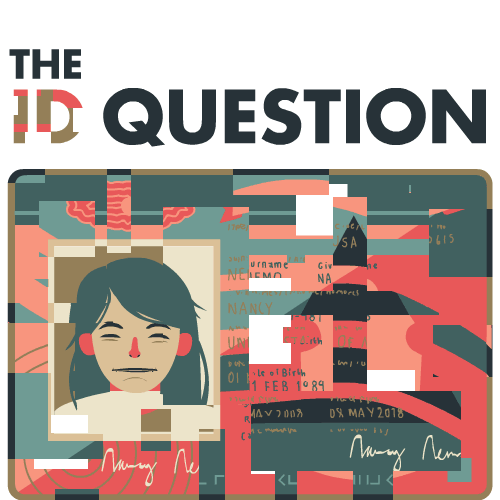

Read the next installment: “What Is It Like to Live in the World’s Biggest Experiment in Biometric Identity?”
Read the previous installment: “What is the ID Question?“

For The ID Question, we’ve curated a reading list on what identity systems look like around the world. It will give you a good sense of the breadth and scope of the series. Feel free to let us know about other good reads on these topics in our Facebook group.

To be a good citizen, it’s important to be able to put yourself in other people’s shoes and see the big picture. If everything you see is rooted in your own identity, that becomes difficult or impossible.
– Eli Pariser

Start Here
If you read one thing on identity systems in the modern age, this should be it. In 2013, Kevin P. Donovan at the University of Cape Town and Carly Nyst, legal director of Privacy International in London, wrote an article in Slate entitled “Privacy for the Other 5 Billion.” In it, they argue that the Western world needs to pay more attention to privacy implications when they back programs like Aadhaar, India’s all-encompassing digital ID system, which is being used as a model around the globe. Here’s a key quote:
“This vigorous adoption of technologies for collecting, processing, tracking, profiling, and managing personal data–in short, surveillance technologies–risks centralizing an increasing amount of power in the hands of government authorities, often in places where democratic safeguards and civil society watchdogs are limited.”

We’ve broken this list down into some of the major topics we cover in The ID Question series:
India & Aadhaar
- “Aadhaar Number vs the Social Security Number“
Elonnai Hickok // The Centre for Internet & Society [7-minute read]
Aadhaar is more than just another version of Social Security. - “The stiff backbone of Aadhaar bill“
Rahul Matthan // livemint [4-minute read]
A legal perspective on the privacy implications of Aadhaar, arguing against Indian government overreach. - Aadhaar: Gender, Identity and Development (2015)
Govind Kelkar, Dev Nathan, E. Revathi, Swati Sain Gupta
An in-depth investigation into how women in particular experience and are affected by Aadhaar. - “The State of Aadhaar Report 2016″”2017“
The Omidyar Network
A good primer about the architecture and infrastructure of Aadhaar. - The Identities Project–Final Report (2017)
Caribou Digital
The Identities Project, which our series is rooted in, covers the key findings of Caribou’s research on attitudes and experiences of digital identity in India. - “Privacy on the line: What people in India think of data protection and privacy“
Dalberg & CGAP & Future of Finance Initiative
More on-the-ground research in India, compiled from by a team of strategists, lawyers, designers, and researchers. - “What a new survey of Aadhaar users can tell us about digital reforms” (2017)
The Center for Global Development
A study that looks specifically at the impact of a digital governance initiative in Rajasthan. - “Unique Identity Project in India: A Divine Dream or Miscalculated Heroism?” (2016)
Rajanish Dass, Indian Institute of Admedabad
Dass speaks to a number of people working on Aadhaar to uncover areas where the system still needs improvement. - Rebooting India: Realizing a Million Aspirations (2016)
Nandan Nilekani & Viral Shah
A passionate defence of Aadhaar, written by one of its chief architects and a software engineer.
Refugees, Immigration, and Cultural Issues
- “The Ungrateful Refugee: “‘We Have No Debt to Repay’“
Dina Nayeri // The Guardian [12-minute read]
A former Iranian refugee, Nayeri settled in the U.S. and then in Europe. She disagrees that refugees should shed their old identities. - “Losing identity during the refugee crisis“
Tracy Brown Hamilton // The Atlantic [8-minute read]
A look at the difference between “integration” and “assimilation” when it comes to kids in school. - “Refugees aren’t the problem. Europe’s identity crisis is“
Natalie Nougayrède // The Guardian [4-minute read]
Nougayrède argues that the continent’s ill-defined identity is more of an issue than a large influx of refugees from elsewhere in the world. - “The “‘floating people’ of Myanmar: how Rohingya refugees reclaim their identity through art and song“
Farzana Kazi Fahmida // The Conversation [6-minute read]
“How do the Rohingyas identify themselves in the midst of such persecution?” - “The Great Divide: Growing up in Rural Washington as a Muslim Immigrant“
Hayat Norimine // SeattleMet [10-minute read]
What it’s like growing up in a Japanese-Syrian household in a small U.S. town, with endless ways to end up feeling like an outsider. - “Japan’s Identity & What It Means“
Kitaoka Shin’ichi, University of Tokyo
An analysis of Japanese national identity, and how its past shape will influence it the 21st century. - “Identification in the context of forced displacement” (2016)
The World Bank
A report into the dangers refugees face due to lack of acceptable identification in their new host countries (or on the way to them).
Work as Identity
- “You Can Have More Than One Work Identity“
Henrich Greve // Knowledge [4-minute read]
A blog from an INSEAD professor of entrepreneurship about how to lead an “authentic” working life, regardless of your career. - “What happens when you can’t be who you are: Professional identity at the institutional periphery“
Jelena Zikic & Julia Richardson, York University (Canada)
What happens to immigrants when they can’t continue their previous careers in their new country.
Personal Stories
- “The File: Lost Then Found“
A.M. Homes // Granta [18-minute read]
A personal essay by the novelist about reading her childhood adoption record from 1961, and its impact on her sense of self. - “Crossing the line: What counts as online harassment?“
Aaron Smith & Maeve Duggan // Pew Research Center [20-minute read]
The rules of digital spaces can be both fluid and opaque, but Pew attempts to define exactly what counts as online harassment. - “Where Are You Really From“
Zara Rahman // Real Life Mag [15-minute read]
Location drop-down menu in online forms force us to make artificial choices about where we’re “really” from. - “Who Decides Who Counts as Native American?“
Brooke Jarvis // New York Times Magazine [25-minute read]
The story of the Nooksack 306, people who were kicked out of a Native American tribe in a dispute over their “rightful” identity. - “How a new technology is changing the lives of people who cannot speak“
Jordan Kisner // The Guardian [18-minute read]
It’s now possible to reconstruct someone’s voice entirely in a computer before they lose it. - “Notes from a Baby-Names Obsessive“
Lauren Collins // New Yorker [14-minute read]
Collins writes about how difficult it was to choose a name for her mixed-heritage child.
Digital Identity & Global Development
- “How digital identification can help boost development“
Mariana Dahan // The World Economic Forum’s blog [5-minute read]
Why the development world finds digital identity systems like Aadhaar so exciting. - “Do we trust digital identification?“
Rosie Spinks // The Guardian [4-minute read]
How our generalized fears about digital privacy could hold back Estonia’s ambitious e-residency program. - “Concerned about Brexit? Why not become an e-resident of Estonia“
Ben Hammersley // Wired [10-minute read]
Conversely, a gung-ho endorsement of e-residency from an early adopter. - “A Blueprint For Digital Identity“
The World Economic Forum
Looking at the roles that financial institutions have to play in building new concepts of digital identity. - “Global Internet Report 2016: The Economics of Building Trust Online–Preventing Data Breaches“
The Internet Society
This edition of the Internet Society’s annual report covers data breaches, and investigates best practices for safeguarding the data ecosystem.

Watch and Listen
Finally, if you prefer to learn in audiovisual form, here are some themed talks, documentaries, and podcasts to watch and listen to.
- “‘Think your email’s private? Think Again’, a TED Talk by Andy Yen.
- Bruce Schneier, author and fellow of the Berkman Center for Internet & Society at Harvard, talks “security and privacy in the world-sized web.“
- Blockchain researcher Bettina Warburg speaks at TED about how she believes blockchain will transform the economy.
- Lives in Limbo is a visual journey of the experiences of refugees in Ireland’s Direct Provision system
- Philosopher and novelist Kwame Antony Appiah delivered the 2016 Reith lectures. Listen to him talk about shared identity in four separate podcast episodes from the BBC: Creed, Colour, Country, and Culture.

Read the next installment: “What Is It Like to Live in the World’s Biggest Experiment in Biometric Identity?”
Read the previous installment: “What is the ID Question?“

How We Get To Next was a magazine that explored the future of science, technology, and culture from 2014 to 2019. The ID Question is a five-part series that asks: Who and what defines us in the digital age? The series follows The Identities Project, field research that looked at the real-life impact of identity systems on individuals in India. It was conducted by Caribou Digital and Storythings and commissioned by the Omidyar Network.
